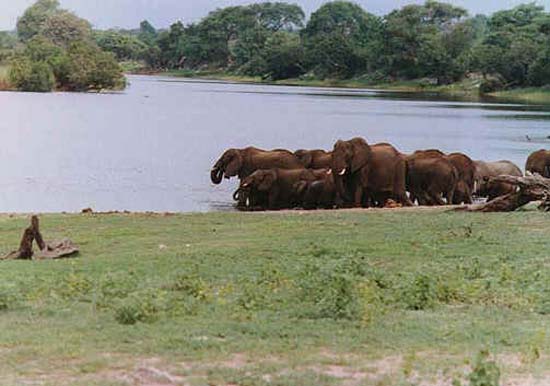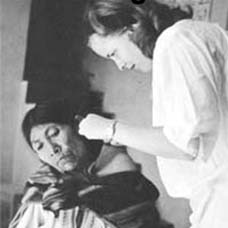
A Profile of Chris Talley: Peace Corps Volunteer in Mochudi
A Profile of Chris Talley: Peace Corps Volunteer in Mochudi
December 22, 2004
Peace Corps Volunteer Christopher Talley arrived in Botswana in March 2003 as one of the first Peace Corps Volunteers in the country since 1997. Before beginning his two-year tour of volunteer work in the fight against HIV/AIDS as a District AIDS Advisor, Chris worked as a Chaplain for Marillac Center for Children and Biology/Chemistry Professor at Longview College in Kansas City, Missouri, in the Midwest of the United States of America. He has a Ph.D. in Pharmacology from Meharry Medical College in Nashville, Tennessee, and a Master’s degree from the Yale Divinity School. When Chris is not working, he enjoys chess, playing with his dogs Brutus and Redeemer, and keeping up with current events. Chris plans to return to Kansas City, where his mother, father and sister live, in May 2005.
We asked Chris about his experience as a Peace Corps Volunteer.
Why did you decide to joins Peace Corps?
I joined the Peace Corps because I wanted to work in the fight against HIV/AIDS. There had been people in my life that had suffered from AIDS. But this issue became especially important to me when, in April of 2001, some Yale University students had boycotted for the relaxing of patents for Anti-Retrovirals (ARVs). From 2000-1, I had been an active member of the Bioethics Symposium, and AIDS in Africa became one of the big issues of our discussions. My graduate school experience exposed me to the international community and I felt I needed to make a difference in HIV/AIDS.
Describe what you do at work.
I am responsible for Monitoring and Evaluation of HIV/AIDS programs in my office. I collect the monitoring tools and help individuals complete the forms. On occasion, I will go out to a village site to advise Village AIDS Committees (VMSACs) or visit a non-governmental organization to collect a report or offer them technical assistance. I present reports at District Multi-Sectoral AIDS Committee (DMSAC) meetings. I develop the funding allocation for our district and follow up with departments and organizations that have not yet spent their funding. I organize DMSAC sectors to meet and coordinate various activities assigned to me. What I do is to try to assist and organize those who work with HIV/AIDS programs in general.
What has been your biggest success at work? What made it successful?
I can remember the District AIDS Fair Steering Committee complaining about how distant the Fundraising Sub-committee was from their target of P4,000. I was motivated to step in and assist them. I decided to complete the donation drive from DMSAC members and raised P170 in one day -- twice the amount raised at that point. I knew that the goal could be reached, and eventually decided to take matters into my own hands. I called the committee together in my office and organized them with a plan of action. We had only six weeks to raise the money needed to finance the cost of the AIDS fair. Working closely with the Chairperson, I organized them into six groups to approach local businesses and asked them to report back at each subcommittee meeting. At each meeting, we got closer and closer to our goal. We raised money from local businesses and got a donation of dinner tickets from the Gaborone Sun Hotel to raffle away. Two weeks before the fair, we had reached our target. In the end, we raised over P5,000. Then the subcommittee helped out other sub-committees that were having trouble raising funds. In the end, they became the heroes of the fair.
What made it successful was the determination of the committee members to solicit funds and the friendships that developed. Teamwork is what made it successful. Each of the committee members has fond memories of working together on that project and some have become close friends because of our work together. Believing that we could overcome the odds gives me hope that Botswana can overcome its AIDS problem.
Why do you think the HIV prevalence rate is so high in Botswana?
One reason is that Batswana do not talk about what bothers them physically or emotionally. No one wants anyone to know that they are sick and people protect information about the ailments of their loved ones from being known by others. It’s a matter of simple lack of communication with regard to health and emotional problems. Stigma is a big problem because no one wants to talk about his or her pain and anguish. Others turn to alcohol or multiple sex partners as a way of escape from harsh realities.
How is what you are doing at your job helping to alleviate the problem?
What I am attempting to do in my final months in Botswana is to work closely with the two PLWA Support Groups to form a network along with working to form another new group to address this issue of miscommunication. This network will give those who have recently tested positive and those who are receiving ARVs a place to share their experiences and eventually go before others to share how they are dealing with their situations. I believe that new friendships and alliances will give fuel to the fight against AIDS. It might not eliminate the problem, but it will give others a chance to voice their views and erase the silence of those who are suffering in Mochudi.
How do you find Mochudi?
Mochudi is a lively place with friendly people. Bakgatla, people of Mochudi, are known for speaking their minds and are quite down to earth people. Everyone is your neighbor and friend in Mochudi.
What are your community’s strengths?
The strength of my community is its leadership. They are committed to helping the people deal with their problems. The community has responded to HIV testing as the numbers have increased each quarter. I see the friendliness of the people and their willingness to communicate with each other on a day-to-day basis as an asset. The business community is growing and the law enforcement is working hard to eliminate crime.
Who in your community has been the biggest help or inspiration to you?
My Setswana tutor, Tebogo Moagi, has really helped me out a lot in adjusting to my community. She taught me the basics about the language and gave me advice on how to adjust to my working and cultural environment. She helped me to shop for needed household supplies when I first came and assisted me when I was terribly ill. Her kindness and caring have been an inspiration and shown me how receptive strangers can be to a person who is trying to find his or her way in a new environment. I am forever indebted to her. After she was promoted from a teacher to a Secondary School Coordinator at BOCODOL, I was further inspired because her hard work as a secondary school teacher, Junior Achievement instructor and Setswana tutor paid off for her.
Describe a typical day for you.
A typical day for me is going to the office. I greet my work colleagues. I stop to greet my friends in the District Health Team and Social Welfare and Community Development offices because I work with a lot of them in many of the HIV programs. I will then read any work-related material and prepare for the various meetings I attend within the office. I collect reports from the DMSAC sectors and instruct them on how to complete their forms and reports. I might have a meeting with the United Nations Volunteer and District AIDS Coordinator about pending issues in the office. At lunch, I will eat either at Tebelopele with their staff or grab a bite from Choppie’s Supermarket or Spar. I also try to motivate my colleagues on the DMSAC to give it their all and to participate regularly.
Since 1966, over 2,100 Peace Corps volunteers have served in Botswana. Peace Corps volunteers must be US citizens and at least 18 years of age. Peace Corps service is a two-year commitment. All of the Peace Corps volunteers now in Botswana are engaged in efforts to fight HIV/AIDS.










